Key takeaways:
- Economic downturns can lead to valuable lessons in resilience, adaptability, and strategic investment approaches, emphasizing the importance of diversification and long-term planning.
- Utilizing crypto analysis engines enhances decision-making during market volatility by providing real-time insights, predictive models, and sentiment analysis to help mitigate emotional reactions.
- Maintaining a calm and informed mindset during downturns can transform challenges into growth opportunities, highlighting the need to leverage data and analytical tools effectively.
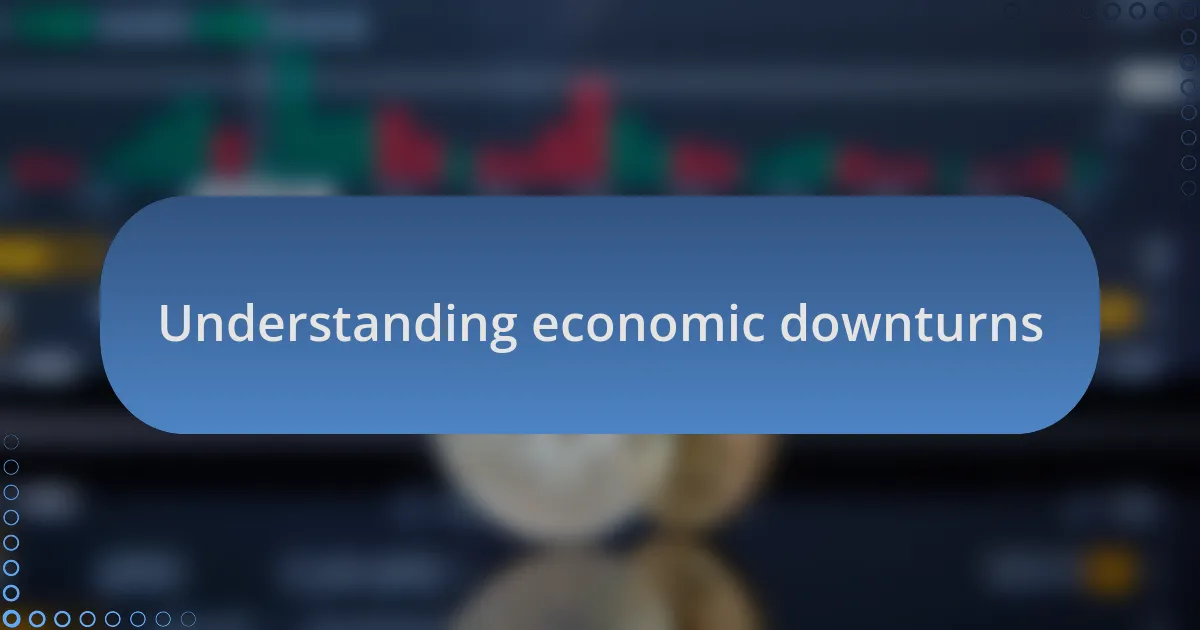
Understanding economic downturns
Economic downturns are periods marked by reduced economic activity, often characterized by falling gross domestic product (GDP), increased unemployment, and declining consumer confidence. I remember facing one during my early career when job security felt like a distant dream. It made me realize how interconnected our financial well-being is with broader economic trends.
Navigating through these downturns teaches valuable lessons about resilience and adaptability. Have you ever found yourself questioning where your financial stability lies? It’s during these times that I learned to diversify my investments and keep a closer eye on market movements, particularly in assets like cryptocurrency, which can respond unpredictably to economic shifts.
Understanding the psychology behind downturns is equally vital. During periods of uncertainty, I often noticed my emotions sway between fear and opportunity. This awareness has driven me to pay closer attention not just to the data, but also to the sentiments driving market behaviors, reminding me that every downturn can bring both challenges and new avenues for growth.
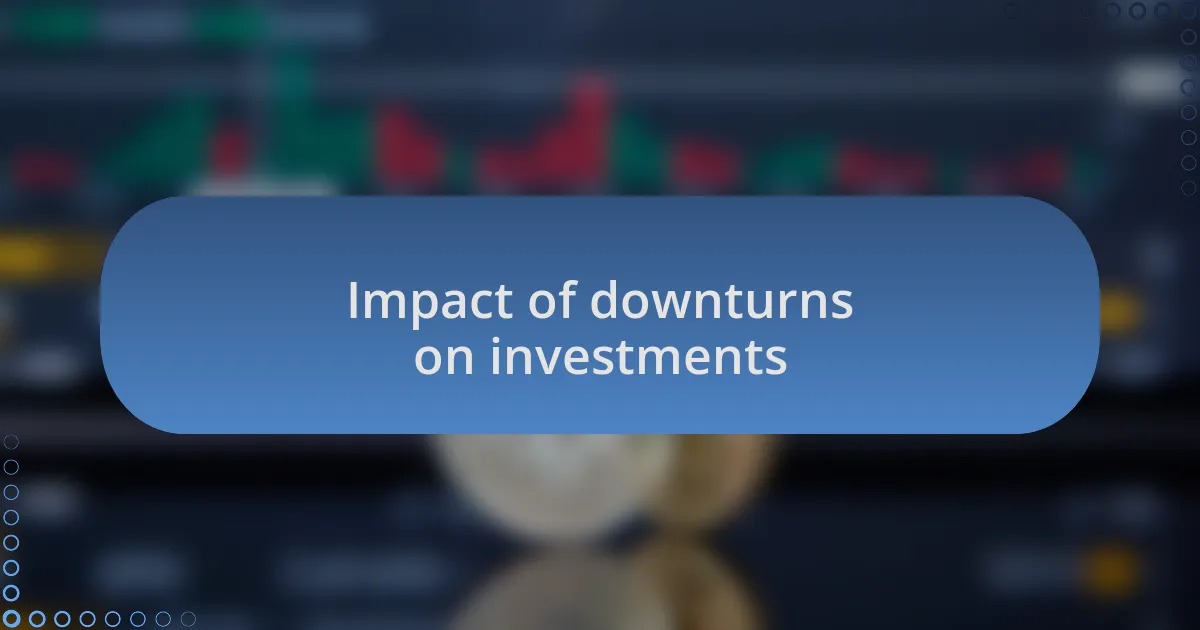
Impact of downturns on investments
Investment portfolios often feel the brunt of economic downturns. I vividly recall reviewing my crypto holdings during one such period and feeling a wave of uncertainty wash over me. Watching the market dip forced me to confront a crucial question: should I hold my assets or reconsider my strategy?
During downturns, many investors experience panic-selling, which can lead to poorly timed decisions. I’ve been in that position where the urge to cut losses felt overwhelming. It took a conscious effort to remind myself that markets eventually recover, and that patience can sometimes yield better results than immediate action.
The fluctuations caused by economic downturns can also create unique investment opportunities. I learned to view the dips as potential entry points rather than reasons to flee. Reflecting on my journey, I often ask, how many opportunities do I let slip away simply because I’m too focused on the storm? It’s essential to distinguish temporary setbacks from long-term potential, especially in volatile sectors like cryptocurrency.
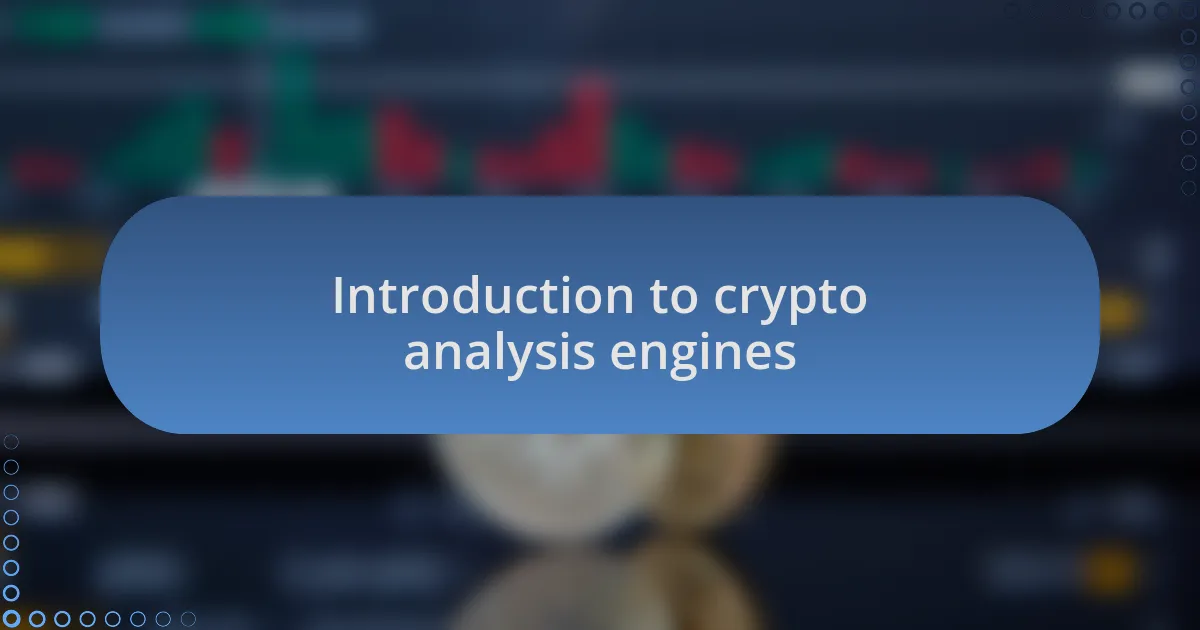
Introduction to crypto analysis engines
Crypto analysis engines play a pivotal role in navigating the complex landscape of cryptocurrency investments. I remember the first time I stumbled upon one—I was amazed at how these tools could aggregate data from various exchanges and provide real-time insights. It’s like having a personal analyst at your fingertips, offering crucial information that can influence investment decisions.
These engines utilize advanced algorithms to analyze market trends, price movements, and sentiment, empowering investors to make informed choices. When I began using a crypto analysis engine, I realized how much more strategically I could approach my trading. Instead of making decisions based solely on gut feelings, I could back my strategies with data, which helped alleviate some of the anxiety that often accompanies volatile markets.
Furthermore, the value of a crypto analysis engine goes beyond basic metrics; it can provide predictive models that forecast market direction. Reflecting on my experiences, I often found myself wondering: how valuable would it have been if I had access to these insights during past downturns? The ability to interpret and act on data can often be the difference between panic and a calculated response when the markets are shaky.
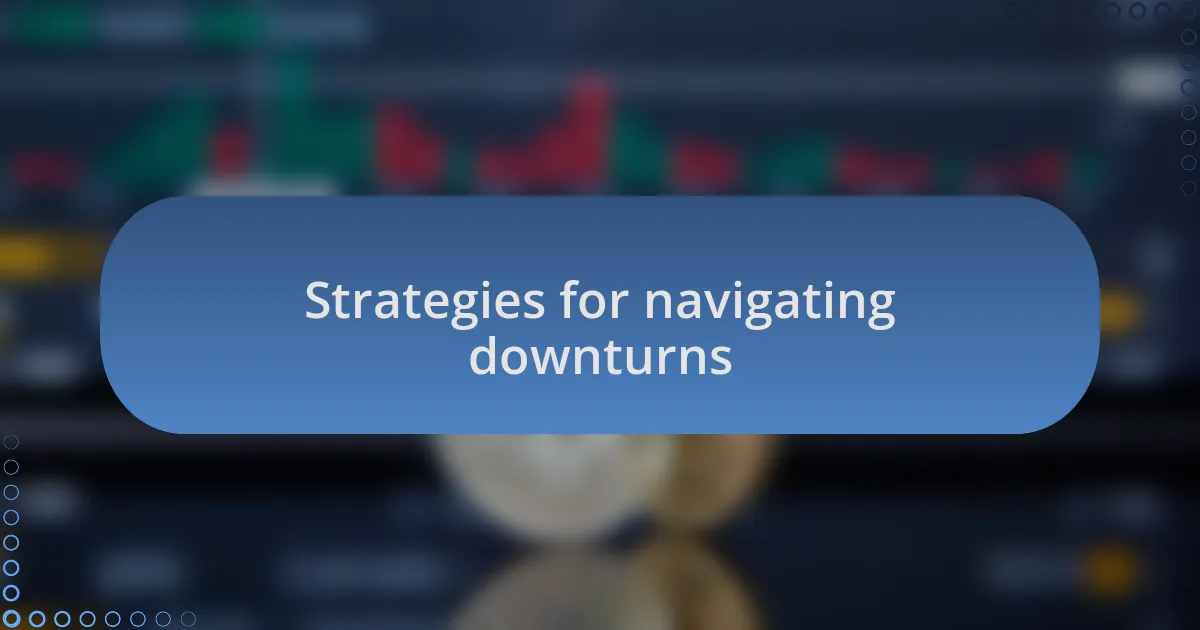
Strategies for navigating downturns
When facing economic downturns, one effective strategy I’ve employed is to diversify my portfolio. Early on in my investing journey, I learned the hard way that putting all my resources into one cryptocurrency can be a recipe for disaster. By spreading my investments across various digital assets, I not only mitigated my risk but also positioned myself to take advantage of unexpected opportunities—even when the market dipped.
Another crucial approach is to think long-term rather than react impulsively to market fluctuations. I vividly recall a time when panic selling seemed like the only option as prices plummeted. However, I chose to hold onto my investments, reminding myself that the crypto market has historically rebounded. This perspective shift not only helped preserve my capital, but it also allowed me the mental space to explore new entries when others were too fearful.
Finally, leveraging data-driven insights through crypto analysis engines has been invaluable. In one particular downturn, I utilized an analysis tool to identify historical patterns and sentiment shifts, giving me the confidence to make calculated decisions. It dawned on me that while emotions can often cloud judgment during tough times, having access to analytical data allows for a more grounded approach. So, why let fear drive your actions when you can turn to data and insights for guidance?
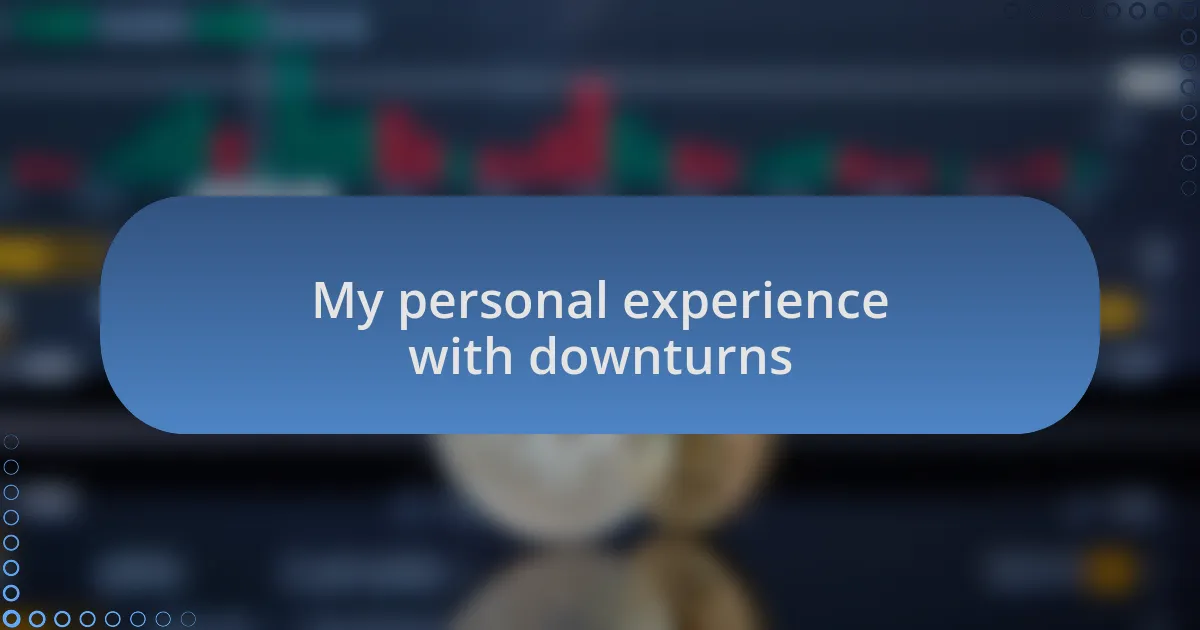
My personal experience with downturns
When I think back to my first major downturn, I remember the sheer anxiety that gripped me as I watched my investments plummet. It was a rollercoaster of emotions—fear, confusion, and even a touch of regret. I had to remind myself that these moments are part of the journey, and sometimes, navigating through discomfort can lead to invaluable lessons.
There was a particular instance when I nearly capitulated during a sharp price drop. Surrounded by friends and fellow investors, the chatter was fraught with doom and gloom. I felt the pressure to conform to the panic, but instead, I took a step back. I recalled an old adage about keeping calm in chaos, and it resonated with me—what if this was just a temporary setback? By holding my ground, I discovered resilience I didn’t know I had.
Reflecting on these experiences, I now see downturns not just as challenges, but as moments that shaped my investment philosophy. They taught me to redefine my relationship with risk and emotion. Have I grown stronger through the struggles? Absolutely. Each downturn has been a catalyst for growth, pushing me to refine my strategies and better understand the market dynamics that drive our decisions.
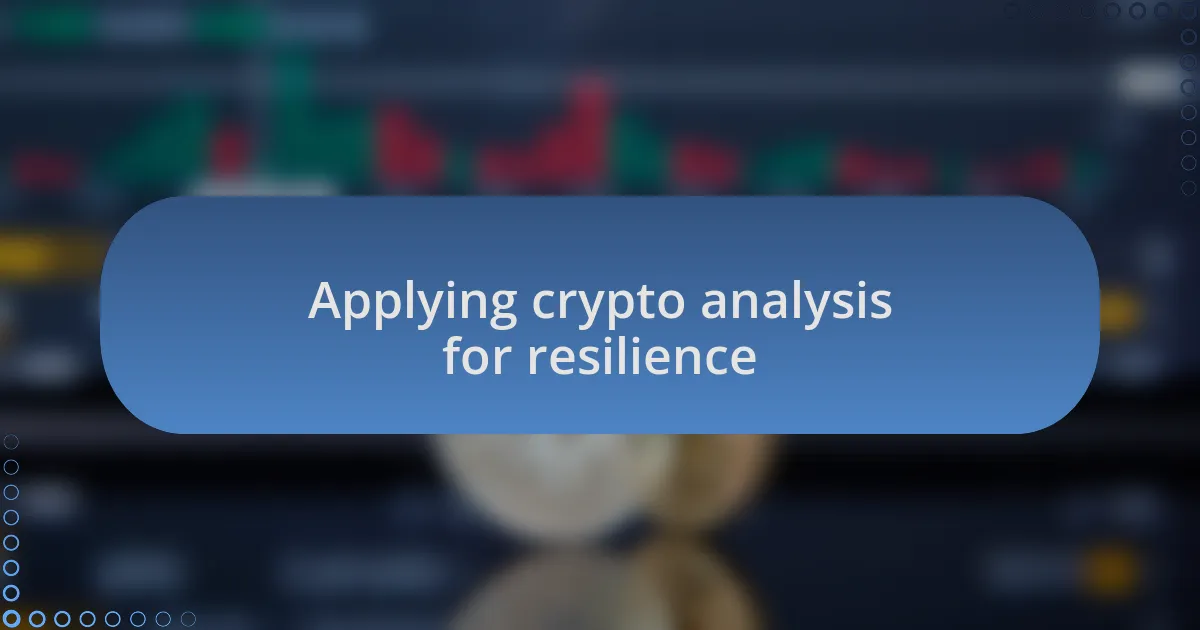
Applying crypto analysis for resilience
Applying crypto analysis during economic downturns requires a strategic mindset. I vividly remember a time when I delved into the data during a market slump, dissecting trends and patterns that often go unnoticed in bullish phases. By analyzing price movements and trading volumes closely, I was able to identify support levels that provided a cushion for my investments. How powerful is it to have that kind of insight at your fingertips, especially when fear looms?
One of the techniques I found invaluable was using sentiment analysis. In a particular downturn, I tapped into social media metrics and discussion forums to gauge the mood of the market. It was fascinating to see how fear could drive prices down, creating a disconnect between inherent value and market perception. This approach helped me make informed decisions rather than emotional ones because I could see beyond the panic.
Incorporating technical analysis tools, like moving averages and relative strength indices, also played a crucial role for me. I recall spotting a bullish divergence in a fading market that nudged me to buy rather than sell. That moment was pivotal because it demonstrated to me that while many were panicking, there were still opportunities to seize. Isn’t it empowering to know that resilience can be cultivated through a deeper understanding of the tools at our disposal?